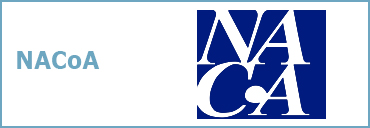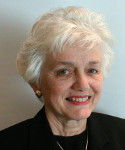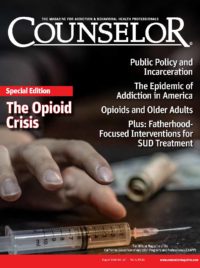Share
“The faith community has unique opportunities to provide information and a supportive environment that welcomes and supports children and families suffering from the effects of addiction in the family. Trust can be rebuilt and healthy relating can be reinforced as those from troubled families learn to reach out for help and take responsibility for accepting and using the help that they receive. The structure of a faith community can sustain a broken family during their rebuilding period. It can hold them until they can hold themselves. That healing support can begin with simple messages about the hope and promise of recovery for the whole family.” – Tian Dayton, MA, PhD, TEP

The addiction epidemic, currently focused on opioids, has been with us for generations and has been excused, misunderstood, and minimized for far too long. Perhaps it is time for readers of Counselor to help their community faith leaders to play their rightful role in addressing this chronic epidemic. Perhaps it is time for those faith leaders to create welcoming congregations for those in recovery or seeking recovery, with special attention to their children and families. We have known for decades that people struggling with addiction in the family often seek help from a faith community.
Faith leaders are the vectors of values in their communities. Enlightened faith leaders can move mountains in congregations, families, and communities. How can we as therapists facilitate that? In my February 2017 Counselor column, I discussed how awareness of the nature of addiction—as well as its pervasiveness in our society and its devastating effects on developing children and families resulting from the addiction of one or both parents—can lead to empathy and understanding. Empathetic faith leaders will readily understand the healing role of caring congregations and could become champions for effective educational programs and support services within their congregations and their communities.
With knowledge about the nature of addiction, including its control of addicted people’s brains and the behaviors that inexorably lead to the destruction of their spiritual lives, faith leaders will begin see the spiritual lives of families also succumb to addiction’s control. With knowledge, faith leaders may be open to not only learning more, but also to realizing that encouraging the congregation and the broader community to act can result in a renewed hope that addiction can be addressed and healing can happen for addicted people and their families.
What Can You Do to Empower Faith Leaders?
You can begin to empower faith leaders by scheduling visits with local pastors or pastoral ministers. Start the awareness process that leads to understanding and action. Tell the stories of a few clients; the generational transmission of the disease; the PTSD that is experienced in adulthood as a result of growing up in the chronic emotional (and sometimes physical) abuse from adverse childhood experiences (ACEs) in an addicted family system; or the struggle of parenting caused by how the parents themselves were raised. You have the stories about the addicted persons and the affected family members and children who are sitting silently in these pastors’ pews.
Offer to help provide the education needed by both faith leaders and their congregations, or find colleagues who would be glad to support such an effort—contact NACoA (by e-mailing nacoa@nacoa.org) if you want previously developed educational materials for such purposes. You can include an offer to add one session to the marriage preparation programs (i.e., a session giving basic information on addiction such as its effect on children, early warning signs, inheritability, and information about adult children of alcoholics (ACoA) and how they are often drawn to partners with similar family backgrounds. The purpose of such a session would be to encourage impacted individuals—that would be at least 25 percent of the candidates for marriage—to attend Al-Anon, or see ACoA counselors to explore the effects of their childhoods on future parenting, or attend open Alcoholics Anonymous (AA) meetings if their drinking is above a healthy level so these candidates for marriage can explore how their family history may be affecting their current thinking or may impede them from having a rich and fruitful marriage. Becoming aware of the possibilities can give these individuals time to prevent the past from sneaking up on them after they are married if they have never addressed what may have happened to them as children. Such an educational session is also instructive for people whose childhoods were safe and secure in loving and safe families because throughout their adult lives, they will encounter adults who had addicted parents and never received validation or help for the hurt they suffered as a consequence.
Help establish a team of addiction professionals, family counselors, and recovering people (including young people in healthy recovery) from the congregation to assist faith leaders by becoming resources leaders can count on to connect suffering congregants to needed help.
Check with Faces and Voices of Recovery to determine if there is a recovery community organization (RCO) already established in your community and introduce your faith leaders to their special ministry of supporting newly sober congregants struggling in early recovery. Be aware that hospitals across the country are beginning to add trained and certified recovery coaches to their emergency rooms, changing the path to recovery after individuals overdose to a hopeful one with recovery coaches in their corner all the way. Many RCOs have trained recovery coaches who are volunteers, and learning about them—about whether they are volunteer or permanent hospital staff, what they do, and how to reach them—could save countless lives. You might even be motivated to advocate in your community hospitals for recovery coaches to be available for the patients and family members they hope to never see.
It has been over sixteen years since the Core Competencies for Clergy and other Pastoral Ministers (see side bar; SAMHSA, 2003) were developed by leading clergy educators across denominations, as well as addiction specialists. The Substance Abuse and Mental Health Services Administration (SAMHSA) supported that work and the many products, one-day trainings, and webinars that have been carefully based on those competencies over the past twelve years. All have been developed under NACoA’s Clergy Education and Training Project and several have been enhanced and continue to be available. Today you have tools crafted by or guided by leading faith educators; we invite you to use them when you visit faith leaders in your community.
There are many strategies and messages to “start the conversation” and there are many tools that have been developed to help you. Begin with one that is most comfortable.
See the sidebar, “Core Competencies for Clergy and Other Pastoral Ministers In Addressing Alcohol and Drug Dependence and the Impact On Family Members”.
References
- Substance Abuse and Mental Health Services Administration (SAMHSA). (2003). Core competencies for clergy and other pastoral ministers in addressing alcohol and drug dependence and the impact on family members. Retrieved from https://www.samhsa.gov/sites/default/files/competency.pdf
About Me
Sis Wenger is the president and CEO of NACoA.













 Counselor Magazine is the official publication of the California Association of Addiction Programs and Professionals (CCAPP). Counselor offers online continuing education, article archives, subscription deals, and article submission guidelines. It has been serving the addiction field for more than thirty years.
Counselor Magazine is the official publication of the California Association of Addiction Programs and Professionals (CCAPP). Counselor offers online continuing education, article archives, subscription deals, and article submission guidelines. It has been serving the addiction field for more than thirty years.